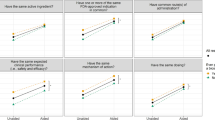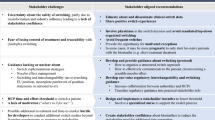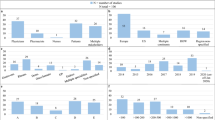Abstract
Background
Biosimilars account for 30–40% of biologic medications dispensed in the United States (US), yet healthcare providers in relevant medical specialties have limited awareness of biosimilars and their characteristics. Likewise, many providers perceive biosimilars as less safe and effective than original biologics and are more comfortable prescribing original biologics to patients.
Methods
We conducted in-person focus groups at three clinical sites in California and Texas (n = 49) to explore the reasons behind US healthcare providers’ limited understanding of, cautious attitudes toward, and reluctance to prescribe biosimilars. We conducted thematic analysis by having three researchers independently analyze verbatim transcripts and identify patterns in provider responses.
Results
Providers’ limited knowledge of and cautious attitudes toward biosimilars are driven by uncertainty about how biosimilarity is defined and operationalized as well as negative past experiences with generic drugs that did not perform as well as branded counterparts. Additionally, healthcare providers are unfamiliar with the Food and Drug Administration’s (FDA’s) approval pathway for biosimilars and are skeptical that an abbreviated approval process is rigorous enough to ensure biosimilars deliver the same efficacy and have the same side effect profiles as original biologics. Physicians also expressed concerns about pharmacy substitution of biosimilars and interchangeables, explaining they would be unaware of which medication was ultimately given to their patients.
Conclusions
Educating physicians and pharmacists about biosimilars—including how biosimilarity is defined and operationalized, the structure of the biosimilar approval process, and how analytical data can ensure biosimilar safety and efficacy—will be important for reducing healthcare providers’ concerns and increasing biosimilar adoption in the US.

Similar content being viewed by others

Change history
07 March 2023
A Correction to this paper has been published: https://doi.org/10.1007/s40259-023-00588-4
References
IQVIA Institute for Human Data Science. Medicine use and spending in the U.S. https://www.iqvia.com/-/media/iqvia/pdfs/institute-reports/medicine-use-and-spending-in-the-us---a-review-of-2018-outlook-to-2023.pdf. 2019. Accessed 16 Feb 2021.
Chen BK, Yang YT, Bennett CL. Why biologics and biosimilars remain so expensive: despite two wins for biosimilars, the Supreme Court’s recent rulings do not solve fundamental barriers to competition. Drugs. 2018;78(17):1777–81.
Makurvet FD. Biologics vs. small molecules: drug costs and patient access. Med Drug Discov. 2021;9:100075.
Blum MA, Koo D, Doshi JA. Measurement and rates of persistence with and adherence to biologics for rheumatoid arthritis: a systematic review. Clin Ther. 2011;33(7):901–13.
Modena V, Bianchi G, Roccatello D. Cost-effectiveness of biologic treatment for rheumatoid arthritis in clinical practice: an achievable target? Autoimmun Rev. 2013;12(8):835–8.
IQVIA Institute for Human Data Science. Biosimilars in the United States, 2020-2024. https://www.iqvia.com/-/media/iqvia/pdfs/institute-reports/iqvia-institute-biosimilars-in-the-united-states.pdf. 2020. Accessed 17 Feb 2021.
U.S. Food and Drug Administration. Biosimilar and interchangeable products. https://www.fda.gov/drugs/biosimilars/biosimilar-and-interchangeable-products. Updated October 23, 2017. Accessed 2 Mar 2022.
U.S. Food and Drug Administration (FDA). Biosimilar product information. https://www.fda.gov/drugs/biosimilars/biosimilar-product-information. Updated February 25, 2022. Accessed 2 Mar 2022.
Kang H-N, Thorpe R, Knezevic I. The regulatory landscape of biosimilars: WHO efforts and progress made from 2009 to 2019. Biologicals. 2020;65:1–9.
Kang H-N, Thorpe R, Knezevic I, et al. Biosimilars—status in July 2020 in 16 countries. GaBI J. 2020;10(1):4–33.
Druedahl LC, Kälvemark Sporrong S, Minssen T, Hoogland H, De Bruin ML, et al. Interchangeability of biosimilars: a study of expert views and visions regarding the science and substitution. PLoS ONE. 2022;17(1): e0262537.
Amgen. 2021 biosimilars trends report. https://www.amgenbiosimilars.com/commitment/trends-report? Accessed 26 May 2022.
Karaca-Mandic P, Chang J, Go R, Schondelmeyer S, Weisdorf D, Jeffery MM. Biosimilar filgrastim uptake and costs among commercially insured, Medicare advantage. Health Aff. 2019;38(11):1887–92.
Socal MP, Anderson KE, Sen A, Bai G, Anderson GF. Biosimilar uptake in Medicare Part B varied across hospital outpatient departments and physician practices: the case of filgrastim. Value Health. 2020;23(4):481–6.
U.S. Food and Drug Administration. Office of generic drugs: 2021 annual report. https://www.fda.gov/media/156066/download. 2022. Accessed 26 May 2022.
Cornes P. The economic pressures for biosimilar drug use in cancer medicine. Target Oncol. 2012;7:57–67.
Yu B. Greater potential cost savings with biosimilar use. Am J Manag Care. 2016;22(5):378.
IQVIA Institute for Human Data Science. The impact of biosimilar competition in Europe. https://www.iqvia.com/-/media/iqvia/pdfs/library/white-papers/the-impact-of-biosimilar-competition-in-europe-2021.pdf. 2021. Accessed 30 June 2022.
Atteberry P, Bach PB, Ohn JA, Trusheim MR. Biologics are natural monopolies (Part 1): why biosimilars do not create effective competition. Health Aff Blog. 2019. https://doi.org/10.1377/hblog20190405.396631/full. Accessed 16 Feb 2021.
Cohen H, Beydoun D, Chien D, Lessor T, McCabe D, Muenzberg M, Popovian R, Uy J. Awareness, knowledge, and perceptions of biosimilars among specialty physicians. Adv Ther. 2016;33:2160–72.
Sarnola K, Merikoski M, Jyrkka J, Hameen-Anttila K. Physicians’ perceptions of the uptake of biosimilars: a systematic review. BMJ Open. 2020;10(5): e034183.
Barbier L, Vandenplas Y, Simoens S, Declerck P, Vulto AG, Huys I. Knowledge and perception of biosimilars in ambulatory care: a survey among Belgian community pharmacists and physicians. J Pharm Policy Pract. 2021;14:53.
Barbier L, Simoens S, Vulto AG, Huys I. European stakeholder learnings regarding biosimilars: Part 1—improving biosimilar understanding and adoption. BioDrugs. 2020;34:783–96.
Herndon K, Braithwaite J, Berry B, Bourget K. Biosimilar perceptions among healthcare professionals and commercial medical benefit policy analysis in the United States. BioDrugs. 2021;35:103–12.
Lewek P, et al. Factors affecting the opinions of family physicians regarding generic drugs: a questionnaire-based study. Bosn J Basic Med Sci. 2015;15(1):45–50.
Liou WS, et al. Brand name or generic? What are the health professionals prescribed for treating diabetes? A longitudinal analysis of the National Health Insurance reimbursement database. Pharmacoepidemiol Drug Saf. 2013;22(7):752–9.
Shrank WH, et al. Physician perceptions about generic drugs. Ann Pharmacother. 2011;45(1):31–8.
Polinski JM, et al. Does knowledge of medication prices predict physicians’ support for cost effective prescribing policies. Can J Clin Pharmacol. 2008;15(2):e286–94.
Kaida-Yip F, Deshpande K, Saran T, Vyas D. Biosimilars: review of current applications, obstacles, and their future in medicine. World J Clin Cases. 2018;6(8):161–6.
Shakeel S, Hassali MA, Rehman H, Rehman AU, Muneswarao J. Knowledge, attitude, and practice towards biosimilars and interchangeable products: a prescriptive insight by the pharmacists. Int J Gen Med. 2020;13:1075–82.
Greene L, Singh RM, Carden MJ, Pardo CO, Lichtenstein GR. Strategies for overcoming barriers to adopting biosimilars and achieving goals of the Biologics Price Competition and Innovation Act: a survey of managed care and specialty pharmacy professionals. J Manag Care Spec Pharm. 2019;25(8):904–12.
Beck M, Michel B, Rybarczyk-Vigouret M-C, Leveque D, Sordet C, Sibilia J, Velten M. Knowledge, behaviors, and practices of community and hospital pharmacists toward biosimilar medicines: results of a French web-based survey. MAbs. 2017;9(2):383–90.
Arnet I, Verbeek M, Almarsdóttir AB, Barbier L, Clifford R, Eickhoff C, et al. Community pharmacists’ preparedness for substituting biologics and dispensing biosimilars: lessons learned from a multinational survey. Explor Res Clin Soc Pharm. 2021;4: 100084.
Leonard E, Wascovich M, Oskouei S, Gurz P, Carpenter D. Factors affecting health care provider knowledge and acceptance of biosimilar medicines: a systematic review. J Manag Care Spec Pharm. 2019;25(1):102–12.
Aladul MI, Fitzpatrick RW, Chapman SR. Differences in U.K. healthcare professionals’ knowledge, attitude, and practice toward infliximab and insulin glargine biosimilars. Int J Pharm Pract. 2019;27(2):214–7.
Barbier L, Simoens S, Vulto AG, Huys I. European stakeholder learnings regarding biosimilars: Part 2—improving biosimilar use in clinical practice. BioDrugs. 2020;34:797–808.
Yang J, Blinzler K, Lankin J, Vijayakumar S, Maculaitis MC, Shelbaya A. Evolving perceptions, utilization, and real-world implementation experiences of oncology monoclonal antibody biosimilars in the USA: perspectives from both payers and physicians. BioDrugs. 2022;36:71–83.
Morgan D. The Focus Group Guidebook. Thousand Oaks: Sage Publications; 1998.
Giacomini MK, Cook DJ. Users’ guides to the medical literature: XXIII. Qualitative research in health care B. What are the results and how do they help me care for my patients? Evid-Based Med Work Group JAMA. 2000;284(4):478–82.
Gale NK, Heath G, Cameron E, Rashid S, Redwood S. Using the framework method for the analysis of qualitative data in multi-disciplinary health research. BMC Med Res Methodol. 2013;13:117. https://doi.org/10.1186/1471-2288-13-117.
Tie YC, Birks M, Francis K. Grounded theory research: a design framework for novice researchers. Sage Open Med. 2019;7:2050312118822927.
Miles M, Huberman A. Qualitative Data Analysis. Thousand Oaks: Sage Publications; 1994.
U.S. Food and Drug Administration. What is the approval process for generic drugs? https://www.fda.gov/drugs/generic-drugs/what-approval-process-generic-drugs. Accessed 31 May 2022.
Cardinal Health. Biosimilars Report: The U.S. Journey and Path Ahead. Dublin: Cardinal Health; 2022.
Acknowledgements
First, we would like to acknowledge Monica Scales (previously of RTI International), who served as one of the study moderators and helped collect data. We also would like to thank Sue Lim, Brian Lappin, Dan Brounstein, Sandy Benton, Karen Canova, Sarah Ikenberry, Danielle Smith, Diane Maloney, and Murewa Oguntimein (US FDA) for their valuable feedback on the study design, data collection processes, results, and implications. Finally, we would like to acknowledge Ashi Nanda, Deborah Wing, Pam Rumney, and Courtney Eakin (University of California, Irvine) for their help recruiting study participants and collecting data.
Author information
Authors and Affiliations
Corresponding author
Ethics declarations
Funding
This research was funded by a contract from the US FDA. The findings and conclusions in this article are those of the authors and do not necessarily reflect the opinions of the FDA.
Conflict of interest
The authors have no conflicts of interest to report.
Ethics approval
The study protocol was reviewed and approved by institutional review boards at the following organizations: (1) RTI International, (2) US FDA, (3) Baylor Scott & White Health, and (4) the University of California, Irvine.
Consent to participate
All participants in this study completed, signed, and returned hardcopy informed consent forms acknowledging their willingness to participate.
Consent to publish
The informed consent statement indicated that data collected from respondents would be reported along with the data of other participants and advised respondents that they could not be personally identified with their responses. Thus, when providing their consent to participate in the study, respondents likewise consented to the publication of the study data.
Availability of data and materials
Data and study materials can be made available for non-commercial use upon reasonable request to the corresponding author.
Code availability
Not applicable.
Author contributions
All authors meet the requirements for authorship and submission. DR oversaw all study activities, collected and analyzed data, and led the writing of the article. AJ and MZ collected and analyzed data and wrote substantial portions of the article. RB and NF recruited participants, supported data collection, and wrote sections of the article. RL provided substantial feedback on the study design and data collection materials, helped analyze and interpret data, wrote sections of the article, and provided substantial feedback on the overall article.
Rights and permissions
Springer Nature or its licensor (e.g. a society or other partner) holds exclusive rights to this article under a publishing agreement with the author(s) or other rightsholder(s); author self-archiving of the accepted manuscript version of this article is solely governed by the terms of such publishing agreement and applicable law.
About this article
Cite this article
Rupert, D.J., Jordan, A.M., Ziemian, M.A. et al. Understanding US Physician and Pharmacist Attitudes Toward Biosimilar Products: A Qualitative Study. BioDrugs 36, 645–655 (2022). https://doi.org/10.1007/s40259-022-00545-7
Accepted:
Published:
Issue Date:
DOI: https://doi.org/10.1007/s40259-022-00545-7



